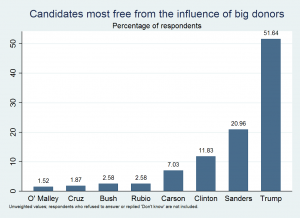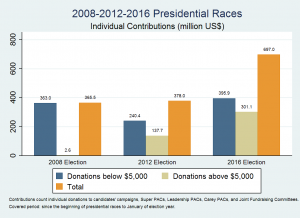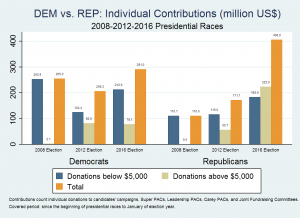March 9, 2016: Stigler Center Survey Reveals: Majority of Americans Concerned About the Influence of Campaign Donors on Candidates
Survey: 57 percent of Americans believe candidates who take money from big businesses, unions, and special interest groups are under their control.
In the past year, the influence of big campaign donors on politics has become one of the central themes of the presidential election. On the Democratic side, Bernie Sanders touts the fact that he does not rely on any super PACs, while on the Republican side, Donald Trump accuses his rivals of being in the pocket of Big Business. Is this just another way for candidates to attack each other on the campaign trail, though, or do these statements reflect a real concern among Americans about the sway of big money over Washington?
A recent survey, commissioned by the Stigler Center at the University of Chicago Booth School of Business, suggests the latter. According to the survey, 57 percent of Americans agree with the statement that “candidates who take money from big businesses, unions and special interest groups are under their control,” while only 43 percent think “Everyone in politics today needs campaign contributions, at the end of the day they are not committed to the big corporations and special interest groups.”
The survey was conducted via telephone between December 22-30 by SSRS, an independent research company, among 1,025 individuals who make financial decisions for their households. It shows that the percentage of Americans concerned about the influence of money in politics is larger among Republicans (55 percent) than among Democrats, where only 46 percent agree that money buys influence. The concern is most acute among independents (62 percent).
These results seem to bode well for Sanders. The Vermont senator may have a steep hill to climb following Hillary Clinton’s strong showing in recent primaries, but Sanders’s protests against the growing influence of big donors did not fall on deaf ears: according to the survey, Americans are well aware of the growing influence of special interests on the political system. However, it appears that they might not think Sanders is the candidate that can best tackle it.
When asked who is the candidate “most free from the influence of big donors,” 51 percent of respondents chose Donald Trump. Despite his repeated calls for campaign finance reform and his insistent avoidance of super PACs, only 21 percent picked Bernie Sanders. According to the survey, only Democrats seem to think that Sanders is more independent from the influence of big donors than Trump, but not by a wide margin (35 percent over 30 percent). Independents trust Trump more than Sanders on this point (51 percent over 21 percent). (It should be noted that since the survey took place in December, before Senator Sanders’s impressive achievements in states like New Hampshire and Oklahoma, it is possible that many voters simply did not know Sanders well enough).

Interestingly, the ranking of candidates follows the Capture Index produced by the Stigler Center, with the only exception that Hillary Clinton did slightly better than Ben Carson in the survey, while in the Capture Index she appears more captured than Carson.
The growing awareness of money influencing politics seems to be split along socioeconomic lines. The more wealthy their household, the more voters seem aware of the potentially corrupting influence of money on the political process. Among respondents with an annual household income of $75,000 or more, 63 percent said that candidates who take money from special interest groups are under their control, compared to 44 percent of households with incomes below 75K.
The income divide is especially large among Democratic voters. 66 percent of Democrats with an annual household income above $100,000 think Sanders is the “most free from the influence of big donors” with only 10 percent choosing Trump (still more than the 9 percent who chose Hillary Clinton). Among Democrats with an annual household income below $100,000, the ranking is reversed: 38 percent choose Trump as most free from the influence of big donors, compared with 26 percent for Sanders and 25 percent who picked Clinton.
These results suggest that if the theme of money and politics remains important in the general elections, Trump will have an advantage over Clinton among all Democrats, in particular blue collar ones. Trump’s favorability on this issue may indicate that Americans believe the only person able to stand up to billionaires is another billionaire.
It is likely that this topic will take center stage as the race progresses, given the growing importance that large donations (above $5000) have assumed in this campaign. At this point in the campaign in 2008, donations above $5,000 represented close to zero percent. In 2012 they represented 36 percent of all the money raised by all candidates; this year they represent 43 percent, but only as a result of the fact that Sanders raised all his money from small donations. For Cruz and Rubio the proportion of large donation is close to 60 percent, while for Clinton, it is around 40 percent.
The following two charts help explain the importance of large donations on the race:


Voters see Trump as the Most Pro-Market, Most Pro-Business
The Stigler Center survey focused on the distinction between pro-market and pro-business policies. While public discourse on economic issues tends to center around questions of small government vs. big government, or laissez faire capitalism vs. government intervention, the Stigler Center believes that the truly crucial decision voters have to make when they enter the polls is between pro-business and pro-market.
A pro-business approach is one that focuses on promoting laws, regulations, subsidies, tax exemptions, and other policies that favor existing businesses, often allowing them to limit competition and maximize profits at the expense of the public and other economic players. A pro-market approach, on other hand, believes competition is essential for the economy to work, and therefore favors policies that don’t allow businesses to accumulate excessive market power and tilt the political and regulatory processes in their favor, such as strong antitrust mechanisms. While pro-market policies threaten powerful incumbents in business and politics, pro-business policies help perpetuate their dominance.
Politicians, both from the left and right, often don’t like to take a clear position on the contradiction between pro-business and pro-market approaches, or even acknowledge there’s a difference. Instead, they prefer to talk about vague terms like “capitalism” and “free markets.” As a result, voters tend to conflate the two approaches.
The results of the survey seem to confirm this. While a large majority (approximately seven in ten) said that competition is good for businesses, for consumers, and for the economy, 52 percent said they “haven’t heard enough” about the distinction between pro-market and pro-business. Forty percent described the distinction as “important.” The proportion did not change much after the differences between the different policies were explained. A majority of over 50 percent responded that a candidate being either pro-business or pro-market will not affect their vote.
The main beneficiary of this confusion is Donald Trump, who was simultaneously described as the most pro-market and most pro-business of all leading presidential candidates. (Given that Trump is the most well-known of all the candidates, and the only one self-identifying as a business man, it is understandable that voters would assume he will maintain a business-friendly approach.)
Forty-one percent described Trump as the most pro-business of the candidates, with only 13 percent giving the title to Hillary Clinton. Bernie Sanders received 5 percent. Twenty-four percent said Trump, whose plans for massive tax cuts would overwhelmingly benefit wealthy households and big firms according to a recent study by the Tax Policy Center, is the most pro-market of the candidates. Hillary Clinton came in second with 16 percent, while Sanders received 7 percent.
Overall, the results of the survey reveal confusion among voters regarding some of the most important issues facing the US economy today. Given that some of these issues are often glossed over, even by people who understand their meaning, the results may not be surprising, but they are troubling, especially since the economy is shaping up to be the main issue in the 2016 election cycle. If voters remain confused about questions of economic policy, politicians will be able to remain vague and non-committal regarding issues of antitrust and competition, a situation that mainly benefits special interest groups and dominant incumbents.

